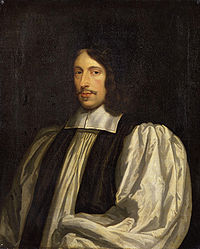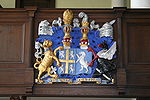
Nathaniel Crew, 3rd Baron Crew
Encyclopedia


Bishop of Oxford
The Bishop of Oxford is the diocesan bishop of the Church of England Diocese of Oxford in the Province of Canterbury; his seat is at Christ Church Cathedral, Oxford...
from 1671 to 1674, then Bishop of Durham from 1674 to 1721. As such he was one of the longest serving bishops of the Church of England
Church of England
The Church of England is the officially established Christian church in England and the Mother Church of the worldwide Anglican Communion. The church considers itself within the tradition of Western Christianity and dates its formal establishment principally to the mission to England by St...
.
Crew was the son of John Crew, 1st Baron Crew
John Crew, 1st Baron Crew
John Crew, 1st Baron Crew of Stene was an English Puritan politician, who sided with the Parliamentary cause during the Civil War but was raised to a peerage by Charles II after the Restoration.-Career:...
and a grandson of Sir Thomas Crew, Speaker of the House of Commons
Speaker of the British House of Commons
The Speaker of the House of Commons is the presiding officer of the House of Commons, the United Kingdom's lower chamber of Parliament. The current Speaker is John Bercow, who was elected on 22 June 2009, following the resignation of Michael Martin...
. He was educated at Lincoln College, Oxford
Lincoln College, Oxford
Lincoln College is one of the constituent colleges of the University of Oxford in the United Kingdom. It is situated on Turl Street in central Oxford, backing onto Brasenose College and adjacent to Exeter College...
and appointed Rector of the college in 1668. He became dean
Dean (religion)
A dean, in a church context, is a cleric holding certain positions of authority within a religious hierarchy. The title is used mainly in the Anglican Communion and the Roman Catholic Church.-Anglican Communion:...
and precentor
Precentor
A precentor is a person who helps facilitate worship. The details vary depending on the religion, denomination, and era in question. The Latin derivation is "præcentor", from cantor, meaning "the one who sings before" ....
of Chichester
Diocese of Chichester
The Diocese of Chichester is a Church of England diocese based in Chichester, covering Sussex. It was created in 1075 to replace the old Diocese of Selsey, which was based at Selsey Abbey from 681. The cathedral is Chichester Cathedral and the bishop is the Bishop of Chichester...
in 1669, Clerk of the Closet
Clerk of the Closet
The College of Chaplains of the Ecclesiastical Household of the Sovereign of the United Kingdom is under the Clerk of the Closet, an office dating from 1437. It is normally held by a diocesan bishop, who may however remain in office after leaving his see...
to Charles II
Charles II of England
Charles II was monarch of the three kingdoms of England, Scotland, and Ireland.Charles II's father, King Charles I, was executed at Whitehall on 30 January 1649, at the climax of the English Civil War...
shortly afterwards, Bishop of Oxford in 1671 and Bishop of Durham in 1674. He owed his rapid promotions to James, then Duke of York
James II of England
James II & VII was King of England and King of Ireland as James II and King of Scotland as James VII, from 6 February 1685. He was the last Catholic monarch to reign over the Kingdoms of England, Scotland, and Ireland...
, whose favour he had gained by secretly encouraging the duke's interest in the Roman Catholic Church
Roman Catholic Church
The Catholic Church, also known as the Roman Catholic Church, is the world's largest Christian church, with over a billion members. Led by the Pope, it defines its mission as spreading the gospel of Jesus Christ, administering the sacraments and exercising charity...
.
After the accession of James II, Crew also received the deanery of the Chapel Royal
Chapel Royal
A Chapel Royal is a body of priests and singers who serve the spiritual needs of their sovereign wherever they are called upon to do so.-Austria:...
. He was part of the ecclesiastical commission of 1686, which suspended Henry Compton, Bishop of London
Bishop of London
The Bishop of London is the ordinary of the Church of England Diocese of London in the Province of Canterbury.The diocese covers 458 km² of 17 boroughs of Greater London north of the River Thames and a small part of the County of Surrey...
(for refusing to suspend John Sharp
John Sharp
John Sharp may refer to:*John Sharp *John Sharp , British television actor*John Sharp , Australian politician, member of the Australian House of Representatives...
, then rector of St Giles's-in-the-Fields, whose anti-papal writings had rendered him obnoxious to the king) and Crew shared the administration of the see of London
Diocese of London
The Anglican Diocese of London forms part of the Province of Canterbury in England.Historically the diocese covered a large area north of the Thames and bordered the dioceses of Norwich and Lincoln to the north and west. The present diocese covers and 17 London boroughs, covering most of Greater...
with Thomas Sprat
Thomas Sprat
Thomas Sprat , English divine, was born at Beaminster, Dorset, and educated at Wadham College, Oxford, where he held a fellowship from 1657 to 1670.Having taken orders he became a prebendary of Lincoln Cathedral in 1660...
, Bishop of Rochester
Bishop of Rochester
The Bishop of Rochester is the ordinary of the Church of England Diocese of Rochester in the Province of Canterbury.The diocese covers the west of the county of Kent and is centred in the city of Rochester where the bishop's seat is located at the Cathedral Church of Christ and the Blessed Virgin...
. On the decline of King James's power, Crew dissociated himself from the court, and made a bid for the favour of William III's
William III of England
William III & II was a sovereign Prince of Orange of the House of Orange-Nassau by birth. From 1672 he governed as Stadtholder William III of Orange over Holland, Zeeland, Utrecht, Guelders, and Overijssel of the Dutch Republic. From 1689 he reigned as William III over England and Ireland...
new government by voting for the motion that James had abdicated. He was excepted from the general pardon of 1690, but afterwards was allowed to retain his see.
He left large estates to be devoted to charitable ends, and his benefaction to Lincoln College and to Oxford University is commemorated in the annual Creweian Oration. In 1697, Crew had succeeded his brother Thomas as 3rd Baron Crew, but the barony became extinct upon his death.
His tenure also saw the first two new parishes to be erected in England since the Reformation
English Reformation
The English Reformation was the series of events in 16th-century England by which the Church of England broke away from the authority of the Pope and the Roman Catholic Church....
. These were at Stockton-on-Tees
Stockton-on-Tees
Stockton-on-Tees is a market town in north east England. It is the major settlement in the unitary authority and borough of Stockton-on-Tees. For ceremonial purposes, the borough is split between County Durham and North Yorkshire as it also incorporates a number of smaller towns including...
in 1712 and Sunderland. The Church of the Holy Trinity in Sunderland, now redundant, was the base for responsible local government in the growing port town for the first time since the Borough of Sunderland, created by the Bishops of Durham, was crushed by Oliver Cromwell
Oliver Cromwell
Oliver Cromwell was an English military and political leader who overthrew the English monarchy and temporarily turned England into a republican Commonwealth, and served as Lord Protector of England, Scotland, and Ireland....
in the English Civil War
English Civil War
The English Civil War was a series of armed conflicts and political machinations between Parliamentarians and Royalists...
.
Crewe also furnished the chapel of Stene Park, Northamptonshire
Northamptonshire
Northamptonshire is a landlocked county in the English East Midlands, with a population of 629,676 as at the 2001 census. It has boundaries with the ceremonial counties of Warwickshire to the west, Leicestershire and Rutland to the north, Cambridgeshire to the east, Bedfordshire to the south-east,...
, of which he was owner.

